Beta Readers are a great source for discovering faults in a draft manuscript, but a Writers Circle can add real value by providing advice on improving the impact of your novel on readers, and for giving encouragement from an author’s perspective. Writers value input from other writers. I recently asked a fellow writer to be part of my Beta Reader group. His input was especially helpful for identifying weaknesses in my plot. He also validated his impressions of my novel from his perspective as a writer. Now, I have the privilege of doing the same for his new novel and we have discovered the joy of forming a small Writers Circle. In conclusion, I have discovered that Beta Readers, and the added value of a Writers Circle, are key elements in helping take my writing to a new level. I appreciate their input – it is like gold to me as an author.
writing
Prepositions expanded
A preposition is a word or group of words used before a noun, pronoun, or noun phrase to show direction, time, place, location, spatial relationships, or to introduce an object. Some examples of prepositions are words like “in,” “at,” “on,” “of,” and “to.”
Prepositions in English are highly idiomatic. Although there are some rules for usage, much preposition usage is dictated by fixed expressions. Used wisely, with effective placement, prepositions:
- Create dramatic effect or flourish.
- Enable the writer to finish scenes/chapters by making a statement of intent.
- Help heighten atmosphere with a sense of immediacy.
- Make a direct point.
- Ask rhetorical questions.
Example 1: He wasn’t sure who they were or where they were going; the human misery cooped up in the foul, stained wooden train. But he was determined to find out.
The placement of the preposition of ‘But’ creates directness, a blunt atmosphere for the scene, and it also becomes an effective way to finish the scene within a determined statement of intent, thus informing the reader of what is yet to come.
Example 2: He stepped back from her, unwilling to engage. She couldn’t find the words…Since when did John start carrying a knife?
Here’s a much better definition:
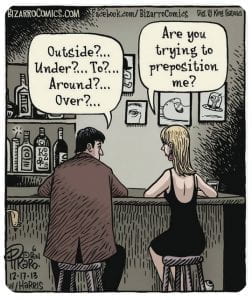
Successful Authors
 “Successful authors are those who know just how difficult it is to write a book.” Stephen Fry
“Successful authors are those who know just how difficult it is to write a book.” Stephen Fry
“A man who is not born with the novel-writing gift has a troublesome time of it when he tries to build a novel. He has no clear idea of his story. In fact, he has no story.” Mark Twain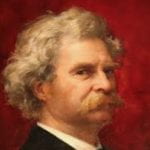
It starts with the fear of writing your first essay in English and submitting papers at college. When I look back on my time as a student, not one teacher was able or willing to give lessons on writing a novel or novella. At college, I was taught by professors who had published works, but they were mainly collections of poetry or scientific works. However, most of my teachers were willing to correct mistakes in my writing. If only they had taken the time to inspire writing? Our heroes were sporting stars and famous politicians or engineers, etc. Except for one, and he was significant—so much so, that I just have to tell you about him in the next post!
When to Introduce Your Main Characters?
A good question. When is the best time to introduce your main characters in your novel? I made a big mistake on this in my second novel—the draft did not feature the main character (the protagonist) and antagonist until later in Chapter 2 and Chapter 3. When I reworked the script to have these characters appear in Chapter 1, along with a strong hint of the conflict between them, it produced better tension and moved the plot along with more pace.
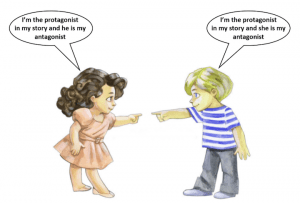 Definitions (from here):
Definitions (from here):
PROTAGONISTS
The definition of a protagonist is basically “the main character”. Here is the Wikipedia definition:
“A protagonist (from Ancient Greek πρωταγωνιστής (protagonistes), meaning “player of the first part, chief actor”) is the main character in any story, such as a literary work or drama. The protagonist is at the center of the story, makes the key decisions, and experiences the consequences of those decisions.”
ANTAGONISTS
The Wikipedia definition of antagonist is the following:
An antagonist is a character whose motivations, goals, desires or opinions are opposed to those of the protagonist.
The important aspect in this alternative definition is the lack of hostility. Remember, I am in favor of tension to drive a story, but not in favor of (instant) trouble. Hope this helps your writing; it sure helped mine!
A Writing Cartoon for Pet Lovers
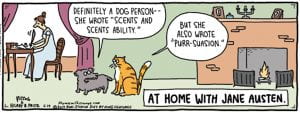
I feel like a ribbon on a kite
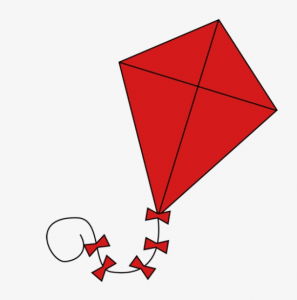 “The more I listen to (literary) agents the more I feel like a ribbon on a kite. Which way does the wind blow today?” Many will identify with this comment. After all, one day you Query Letter is not up to the task, the next your word count is too low; another day you chose the wrong sub—genre, and the next you made a grammatical error.
“The more I listen to (literary) agents the more I feel like a ribbon on a kite. Which way does the wind blow today?” Many will identify with this comment. After all, one day you Query Letter is not up to the task, the next your word count is too low; another day you chose the wrong sub—genre, and the next you made a grammatical error.
One thing you need to keep reminding yourself is that the ‘answer is blowing in the wind.’ Just hang on to that kite!
Like you, I am hoping that the wind will blow my way. I have published before, have self-published, have a couple of blogs going and believe in the book I have finished enough to stay clinging to the tail of the kite I am chasing!
Shaken not stirred?
 Bob French says, “James Bond’s famous tag line is actually a reversal of the original quote from Fleming’s books. The author used the line “stirred not shaken” to add yet another facet to Bond’s cool image. If a Martini is shaken, the alcohol becomes “bruised”, which detracts from the desired flavour – something which agent 007 would of course immediately notice and be suitably repulsed by. It was decided that the line “shaken not stirred” sounded much better, however, and so was adopted for the film – thus creating a character with a good collection of sound bytes, but a slightly odd taste in drinks.”
Bob French says, “James Bond’s famous tag line is actually a reversal of the original quote from Fleming’s books. The author used the line “stirred not shaken” to add yet another facet to Bond’s cool image. If a Martini is shaken, the alcohol becomes “bruised”, which detracts from the desired flavour – something which agent 007 would of course immediately notice and be suitably repulsed by. It was decided that the line “shaken not stirred” sounded much better, however, and so was adopted for the film – thus creating a character with a good collection of sound bytes, but a slightly odd taste in drinks.”
 Author Dr. Saumya Dave gives candid advice to aspiring authors when she recounts taking 10 years and 200 agent rejections before getting her 2-book publishing deal. Her training as a psychiatrist helps her give deep insight into the lonely world of writers. One thing she mentioned is the importance of allowing time for ideas to germinate—that is, stirred, not shaken! There is an inherent danger in expecting to progress as a writer to a deadline. Finding a literary agent is not ‘speed dating’! Saumya says, “Writing was the first time I’m my life that I had played with failure and rejection.” But, she never gave up (well, she almost did). Check out her inspiring interview with here.
Author Dr. Saumya Dave gives candid advice to aspiring authors when she recounts taking 10 years and 200 agent rejections before getting her 2-book publishing deal. Her training as a psychiatrist helps her give deep insight into the lonely world of writers. One thing she mentioned is the importance of allowing time for ideas to germinate—that is, stirred, not shaken! There is an inherent danger in expecting to progress as a writer to a deadline. Finding a literary agent is not ‘speed dating’! Saumya says, “Writing was the first time I’m my life that I had played with failure and rejection.” But, she never gave up (well, she almost did). Check out her inspiring interview with here.
Ideas bigger than your life!
I came across a wonderful quote recently, by Gloria Gaither. She said, “You need to have ideas bigger than your life.” How profound and how ideal to sum up a writer’s goal. Novels, like paintings, can lift us above the ordinary and create worlds far bigger than our own lives; far longer than our histories and far removed from our world. Thank you, Gloria, for inspiring us to have ‘Ideas bigger than our lives’!
The Hook and the Divine Moment
Hello again! Publishers look for the ‘hook’ in a thriller, etc. As writers, we look for the ‘divine moment’ that gives us the hook, or at least an important plot. My second thriller (shh, no name yet) was inspired by a small newspaper clipping that mentioned submarines—which explains the picture below :-). The article fascinated me and led to a world-wide hunt (including visits to the USA, Croatia, Gibraltar, etc.) for more information. I am grateful for contacts who expanded my ‘Aha!’ moment, and provide fresh insights to help put the book together. Yes, divine moments are key to my writing!

Editing technique during writing
 David McGowan, based in Liverpool in the UK, made the following comment during an interview:
David McGowan, based in Liverpool in the UK, made the following comment during an interview:
“From my first novel to my second, I have found that my writing is a lot more developed, but I think editing your work well is as important as writing a good story.
I also find that editing the last couple of scenes I have written when I sit down to write pulls me back into the story and helps me to focus and feel part of the world I have created.”
This is good advice gives cohesion to writing. Thanks, David. You can check out the full interview here.
